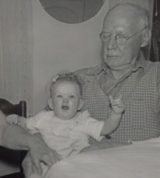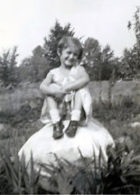As a girl growing up in a neighborhood of Quincy, Massachusetts called Squantum, my mother watched her grandfather, Thomas ‘Grampie’ Murch, sew up a hole in his galoshes. This was pretty much impossible to do, she said, as the overshoes were made of thick rubber. Still, her very frugal grandparent “made do” by repairing rather than buying new. People those days, mom said, believed…
Buy it New. Wear it Out. Make it Do. Do Without.
Yes, this was the 1930-40’s (the Depression and WWII were on the table). During the early 1940’s when the US was gearing for war, everyone tightened their belts. I recall hearing about crushing yellow coloring tablets into lard to mimic butter, “We were just trying to hold body and soul together.” Most families had only one vehicle and that was saved for the drive to work.
My mother, Helen Renshaw, lived with her grandparents Amy and Thomas Murch until her mother, Ethel, remarried and she’d spend weekends with her mother and new step-father, Warren. Grampie would give little Helen (nicknamed Tweet for her tiny stature) a paper bag with candy to take with her to her mother’s apartment. He’d play the same game with her each Friday, shaking the bag, asking her to guess what was inside. Both knew, both laughed.
I’ve always wondered about the above-mentioned credo. The Murch clan was ‘Yankee’ through and through and my mother practiced frugality religiously.
This ditty of ‘buy it new’ has New England-based variations. President Calvin Coolidge (Vermont-born, 1872-1933) called them the ‘Four Maxims that made New England great.’ And he was serious about his conviction. The maxims were also described in 1937 as “the four threads of the New England character.” They are:
‘Eat it up. Wear it out. Make it do. Do without.’
‘Eat it up’ is synonymous with the familiar injunction to finish your plate. Or perhaps not these days. For me, it brings up images of my sister Dianne sitting at the kitchen table, alone. Dinner is finished save for her portion of peas left on the plate. Cold, shrunken peas eventually downed with gulps of milk.
Many dinnertimes were marathons of mandatory consumption.
And ‘wear it out’ has a different meaning for me. I was worn out by these endurance trials. Mealtime with psychological struggles encourage indigestion.
‘Do without’ includes almost everything. You ‘did without’ because it was virtuous to do so, or do without… A mindset fixed on achievement through denial.
Mom once avoided buying a new winter coat as she made do with the growing threadbare sleeves of her old one. When my father realized the coat’s condition he impelled her to buy a new one that would keep her warm! This was New England and winter was long, dark and cold. I still sense the pain in his voice and expression. It was no virtue for his wife to suffer when, as a fairly successful salesman, they could afford the purchase.
By the way, my mother hated the nickname, Tweet.
–
More on Silent Cal (Coolidge) about whom I knew almost nothing. It always seemed to me that there were the Founding Fathers then we jumped to Lincoln, Teddy Roosevelt, FDR and the latest lineup. Calvin was born in Vermont, became a lawyer and served politically in Massachusetts eventually becoming Governor of the state. He was known for being frugal with words – with a dry wit. When a woman challenged him to say three words he replied, “You lose.” Not surprising that there’s a collection of his quotes.
His speeches are worth rereading. In 1914 Coolidge was elected President of the Massachusetts State Senate and gave his “Have Faith in Massachusetts” speech. The entire presentation is provided by this Coolidge Foundation link. Below is a famous portion of the speech. I’ve skipped ahead to the last paragraph which is entirely refreshing given today’s despiritualized milieu:
“Do the day’s work. If it be to protect the rights of the weak, whoever objects, do it. If it be to help a powerful corporation better to serve the people, whatever the opposition, do that. Expect to be called a stand-patter, but don’t be a stand-patter. Expect to be called a demagogue, but don’t be a demagogue. Don’t hesitate to be as revolutionary as science. Don’t hesitate to be as reactionary as the multiplication table. Don’t expect to build up the weak by pulling down the strong. Don’t hurry to legislate. Give administration a chance to catch up with legislation…
(beginning of final paragraph of speech)
Man has a spiritual nature. Touch it, and it must respond as the magnet responds to the pole. To that, not to selfishness, let the laws of the Commonwealth appeal. Recognize the immortal worth and dignity of man…”
I can’t help point out the ‘do the day’s work’ reminds me of a New England Patriot’s game slogan, ‘Do Your Job.’ And how refreshing to hear him ask the senate to help powerful business better serve the people. This is a positive take on the more typical, negative condemnation of the business world.
Now ‘stand-patter’ is a term that’s gone out of usage these days but originated in the US vernacular in the early 1900’s. Also written as standpatter it refers to someone who opposes or won’t accept change. I’ve heard of it in the context “to stand pat” meaning to not budge, or move, particularly in one’s opinion. Neither positive or negative in my estimation.
And what about this “expect to be called a demagogue” and “as revolutionary as science” or “reactionary as the multiplication table”? Makes you think, doesn’t it? Don’t just arouse emotions with provocative speech but encourage, perhaps, ‘righteous indignation.. In my estimation, comparing public service to be ‘as revolutionary… or as reactionary’ is a call to even-tempered courage. To drain the fear of rejection or reprisal from actions that are as fundamental as ‘science’ or ‘the multiplication table.’ 2 + 2 often equals 4, doesn’t it?
Now, to hear him say, ‘don’t expect to build up the weak by pulling down the strong’ is marvelous. In other words, to merely overthrow the strong will not necessarily ‘build up’ – strengthen, enhance – those weakened by wrongs. He’s calling for a (radical?) upliftment of both weak and strong; raising both in awareness. Mahatma Gandhi (1869-1948) immediately comes to mind. His Satyagraha movement (the nonviolent resistance to evil) called for moral courage by the Indian populace (disfranchised, suffering through violent suppression of their rights). The non-violent suffering aroused a sense of moral shame in the British ‘ruling class’ (and world-wide indignation) that changed the ruler-subjugation status-quo.
Coolidge echoes the Satyagraha truth in his closing words, “Man has a spiritual nature. Touch it, and it must respond as the magnet responds to the pole.” As revolutionary as science.
Silent Cal, the little known, often overlooked president. And he wouldn’t mind being overlooked if his values were recognized and put to use. In this vein I want to conclude by acknowledging someone who influenced this 30th US president.
About 40 years after graduating from Amherst College, Coolidge recalls principles he learned from his ethics professor Charles Edward Garman (1850-1907) who was also referred to as a ‘Congregational mystic.’
[T]here is a standard of righteousness that might does not make right, that the end does not justify the means, and that expediency as a working principle is bound to fail. The only hope of perfecting human relationships is in accordance with the law of service under which men are not so solicitous about what they shall get as they are about what they shall give. Yet people are entitled to the rewards of their industry. What they earn is theirs, no matter how small or how great. But the possession of property carries the obligation to use it in a larger service…
Nice words, Professor. I’m sure you influenced many, many lives.
 You never know where life will take you when reminiscing about a great-grandfather sewing his galoshes. I never met Grampie Murch, but here I am at about 6 months sitting in his lap. He died not long after this photo; a casualty of handling asbestos on the job.
You never know where life will take you when reminiscing about a great-grandfather sewing his galoshes. I never met Grampie Murch, but here I am at about 6 months sitting in his lap. He died not long after this photo; a casualty of handling asbestos on the job.
My future ex father-in-law would represent one of the firms sued in this far-reaching action against the asbestos industry.
